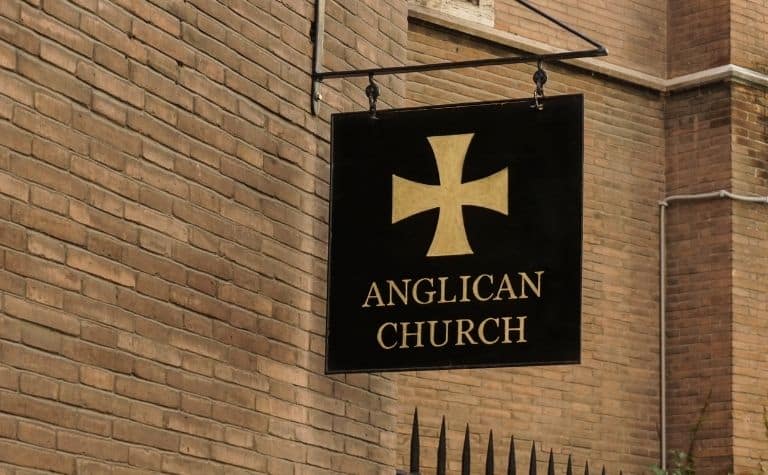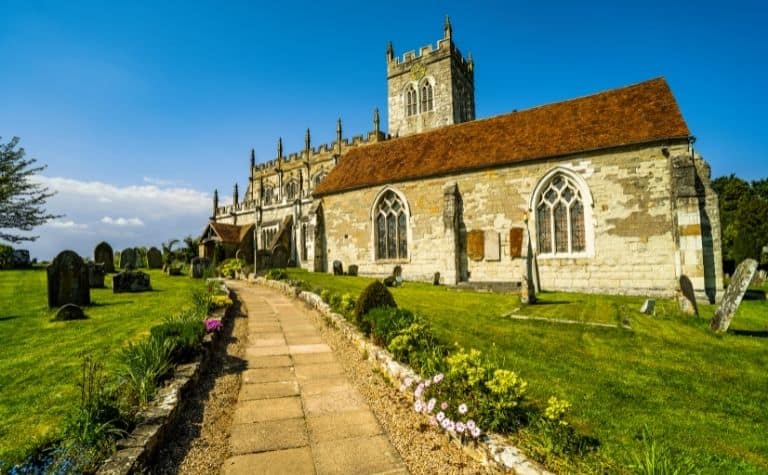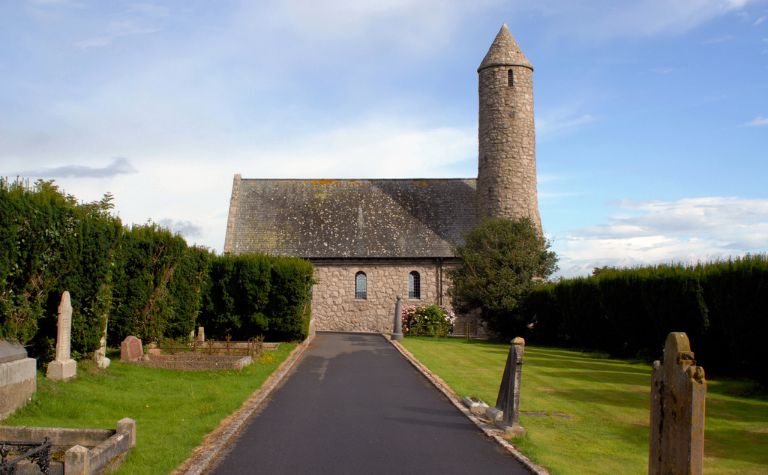Many people have heard of the Episcopalian Church and the Anglican Church or Communion and know that they are Christian traditions but are unsure what the differences are between them. What are each tradition’s beliefs, practices, and origins? What relationship do the traditions have with each other?
The Anglican church, also called the Anglican Communion, refers to the Church of England established by King Henry VIII at the time of the Protestant Reformation. The Episcopal tradition is an offshoot of the Church of England in America, whose allegiance remains with the worldwide Anglican Communion.
Why is the tradition known as “Episcopalian” in America? What’s the largest Episcopalian denomination in America? What are the “high church” and “low church” Anglicanism and Episcopalianism?
What do Episcopalians and Anglicans believe about God, the Bible, Jesus Christ, and other doctrines? Keep reading to learn the answers to these questions and others.
Also, see Episcopalian vs. Methodist: What’s the Difference? to learn more.

The Meaning of Anglican, Church of England, and Episcopal
A church tradition that has multiple names can cause confusion for people who are unfamiliar with the topic. Understanding a few simple definitions and a little history will provide helpful clarity.
- Anglican: From the Latin phrase ecclesia anglicana, the term means the “English Church.” This term is less common in America. Nevertheless, “Episcopalian” denominations and churches are considered part of the worldwide Anglican Communion.
- Church of England: The term refers to the Protestant branch of Christianity that King Henry VIII (1491-1547) and his successors established in England in the 16th century. In many contexts, the terms “Anglican” and the “Church of England” are used interchangeably.
- Episcopalian: From the Greek word for “overseer” and the Latin word for “bishop,” the term refers to a form of church government that locates ecclesiastical authority in the office of bishop as opposed to the papacy, like in Catholicism, or the congregation, like in some Protestant traditions. The term is also used to identify a person committed to such a church.
Why is the tradition known as “Episcopalian” in America? The term refers to the form of church government that the tradition employs.
Other historical branches of Christianity, like Roman Catholicism, Eastern Orthodoxy, and some Lutheran denominations, also have an episcopal form of government.
In America during the Revolutionary War (1775-1783), leaders and members increasingly identified themselves as “Episcopalian” because of tension between the Americans and the English.
The “Church of England” had a negative connotation to many people, and some thought rebranding the tradition would help.
Are there Episcopalian churches outside of America? Yes. Most non-American Episcopal churches have been planted by churches and missions organizations that are based in the states.
“Anglican” churches exist outside England and are largely the result of the Church of England’s missions and evangelism work.
| Episcopalian | |
|---|---|
| Branch of Christianity | Because its part of the Anglican Communion, many people consider Episcopalianism halfway between Protestantism and Catholicism. Many theologians and historians posit that a church can’t be “halfway Catholic,” so it’s best to consider the tradition Protestant with aspects of Catholicism woven into certain churches. |
| Founding | The Anglican tradition dates to the time of King Henry VIII and his protests against the Catholic church. Anglicanism arrived in America as soon as settlers arrived from England. The “Episcopalian” church dates to the time of the Revolutionary War. |
| Early contributors | King Edward VI (1537-1553), Queen Elizabeth I (1533-1603), theologian Richard Hooker (1554-1600) |
| Membership | The Anglican communion has 85 million members worldwide. The Episcopalian tradition in America has over 2 million adherents. There are less than 1 million “Episcopalians” outside America, which is largely the result of the tradition’s global missions work. |
| Doctrinal emphasis | Episcopalianism, like the Anglican communion, values the Bible. Historically, the tradition has affirmed the Apostles and Nicene Creed. The Book of Common Prayer is also a pivotal document to the heart and identity of the tradition. |
| Social worldview today | The “Episcopal Church,” the largest communion in America, is socially and theologically liberal. |
Also, see Episcopalian vs. Protestant: What’s the Difference? to learn more.

Episcopalianism In America
By a significant margin, the “Episcopal Church” is the largest denomination in the tradition. Denominations and churches have split over theological, political, and social issues.
Examples of contentious topics include women in ministry, allegations of devaluing Scripture, and issues related to same-sex marriage and gender identification.
| Episcopal Denominations | Reported Membership |
|---|---|
| Episcopal Church | 2 million |
| Anglican Church in North America | 112,000 |
| Continuing Anglican Churches | 100,000 |
| Reformed Episcopal Church | 15,000 |
Is the Episcopal Church liberal? In recent years, the Episcopal Church denomination has aligned with the values and beliefs of the liberal-progressive worldview, as it’s defined in the context of American political dialogue.
This has created significant tension with conservative members of the tradition who seek to maintain the theology, practices, and morals of historic Anglicanism.
What Are the “High Church” and “Low Church” Anglicanism and Episcopalianism?
The high church wing emphasizes the tradition’s similarities to Catholicism and practices aspects of High Mass. The low church wing emphasizes the tradition’s similarities with Protestantism and its roots in the Reformation.
- Today, some Episcopalian congregations in America emphasize beliefs and practices that are considered Catholic.
- Other churches are aligned with conservative evangelical theology, some of which embrace charismatic expressions of worship and prayer.
- Still, other Episcopal churches have largely abandoned historical Catholicism and Protestantism and have adopted liberal and progressive social-political convictions and have less theological focus.
Anglican and Episcopalian Beliefs
| Episcopalianism | |
|---|---|
| Ecumenical Councils | As part of the Anglican communion, the Episcopalian tradition affirms the first four councils: Nicaea, Constantinople, Ephesus, and Chalcedon. It sees value in other councils to the degree that they conform to Scripture. |
| Human Leader | “The Archbishop of Canterbury” is the senior bishop and principal leader of the Anglican Communion in England. Today, the English monarchy is only the ceremonial leader of the church in England. In America, “the Presiding Bishop” is the chief pastor of the Episcopalian Church. |
| View of the Bible | Traditionally, the “low church” (see above) has a high view of Scripture in alignment with Protestantism. The “high church” values Scripture plus ecclesiastical tradition. Liberal and progressive congregations have decentralized Scripture. People can read deutero-canonical literature or the Apocrypha, but they can’t be used to establish doctrine. |
| View of God | Episcopalians believe in the Trinity; there is one God who exists in three persons. The Father, Son, and Holy Spirit are each fully divine. |
| View of Christ | Historically, Episcopalianism has affirmed that Jesus is the second person of the Trinity. He is God in human flesh. He is 100% God and 100% man. Jesus was born of a virgin, lived a sinless life, died as an atonement for sin, was physically resurrected on the third day, and ascended into heaven. |
| View of Salvation | Episcopalianism’s roots in Anglicanism are closer to Calvinism than Arminianism. However, Arminianism grew to characterize and influence the tradition more. Today, liberal and progressive congregations are ecumenical and inclusive of other religions. |
Also, see Christianity vs. Mormonism: What’s the Difference? to learn more.

| Episcopalianism | |
|---|---|
| View of the Holy Spirit | The Holy Spirit is the third person of the Trinity. He is fully divine. Episcopalians are historically cessationists, yet some small communions practice charismatic worship (e.g., International Communion of the Charismatic Episcopal Church). |
| View of the sacraments or ordinances | All Episcopalian expressions recognize baptism and the Lord’s Supper. Those who have convictions that align with the high church recognize the other five that Catholicism does. The Anglican-Episcopalian tradition teaches that the sacraments are a means of grace, as in Catholicism. |
| View of the Lord’s Supper | Christ is present in the Eucharist, but there is a mystery to it. The tradition doesn’t fully embrace Catholicism’s theology of the Eucharist but affirms that consuming the elements is more than simply a memorial practice. |
| View of the Baptism | Clergy baptize infants and adults; baptized individuals are “grafted into the church.” |
| View of the End Times | Episcopalians believe in the Second Coming of Christ. The tradition’s eschatology is Amillennial, as opposed to Premillennial or Postmillennial. |
Also, see Episcopalian vs. Christianity: What’s the Difference? to learn more.
Related Questions
Catholic vs. Protestant vs. Orthodox: What's the Difference?
Roman Catholicism, Protestant Christianity, and the Eastern Orthodox Church are the three historical branches of the Christian religion. Each tradition traces its doctrines and practices to the New...
Episcopalian and Baptist are two of the largest branches of the Christian faith in America, though churches belonging to each tradition can also be found around the world. Many people know that...
